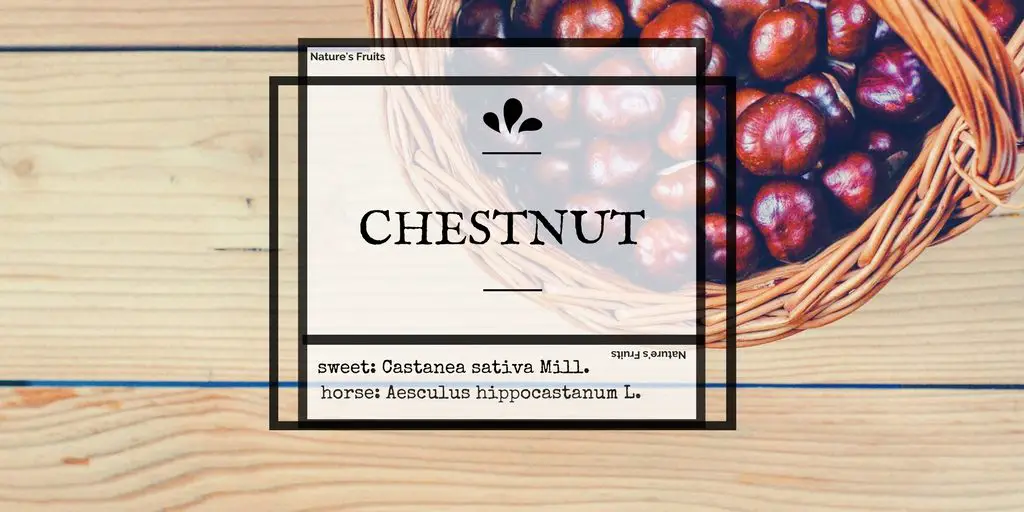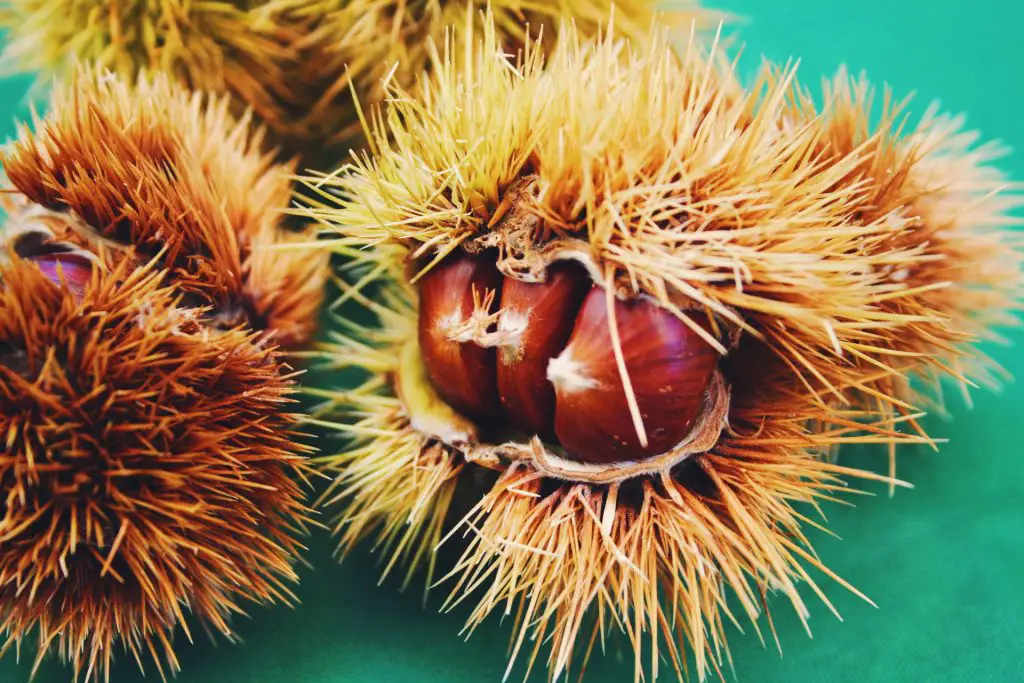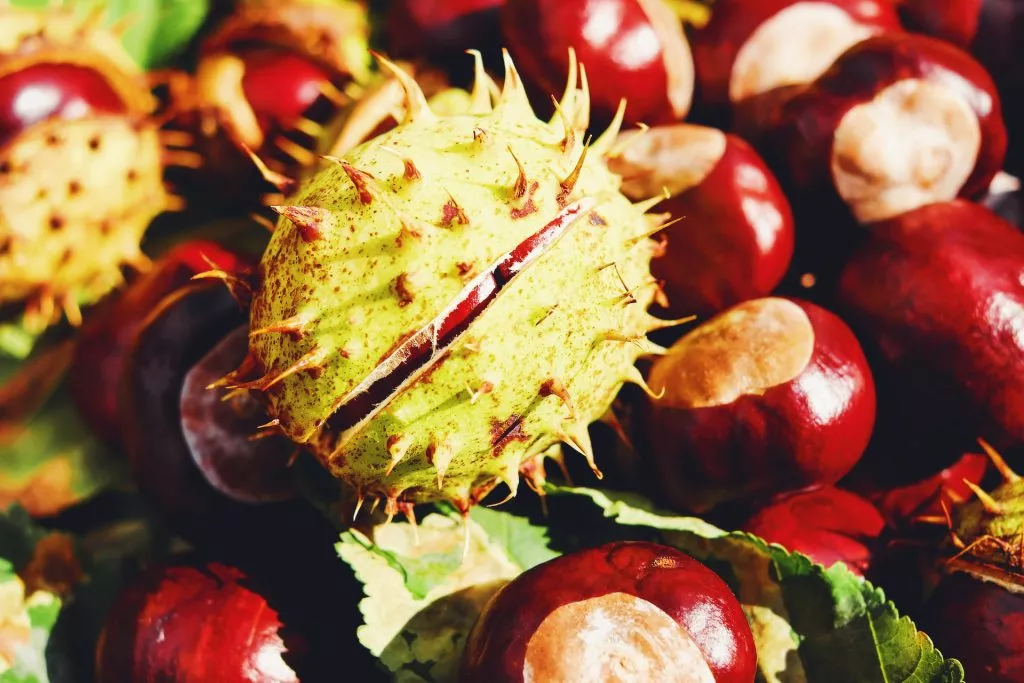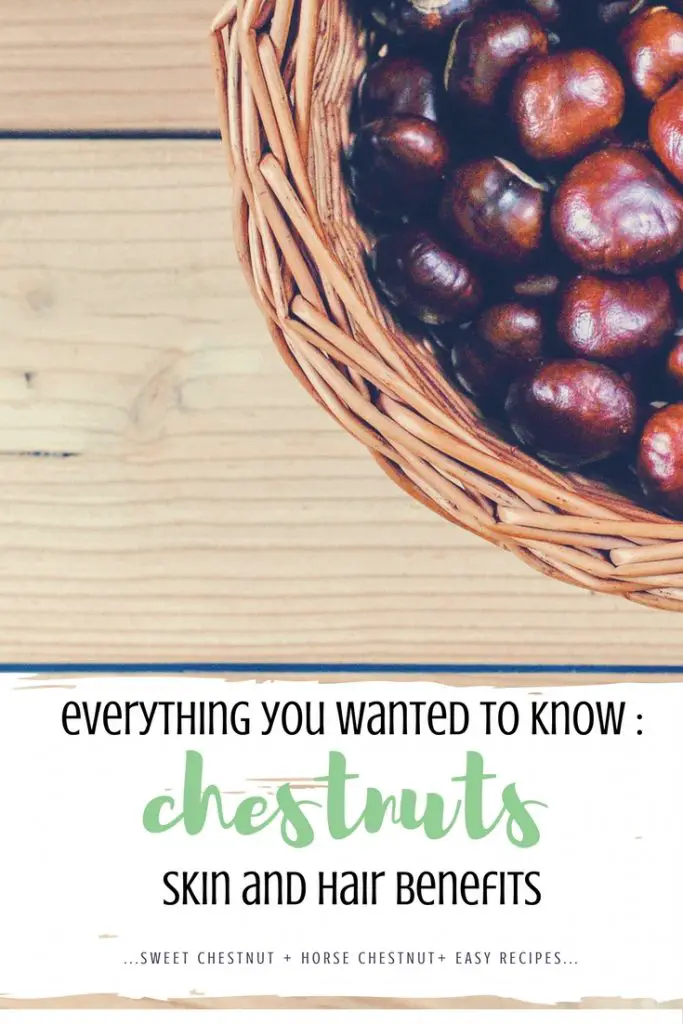Chestnut season is here and there are stands around every corner, selling roasted chestnuts. I don’t know about you, but I love the smell of roasted chestnuts; it reminds me of scarves, mulled wine and crisp clear nights. Yes, daydreaming a bit, but I decided to dedicate this post chestnut skin and hair benefits and to find out if there are any at all.
Chestnut love story
Whenever I think of chestnuts, I think of walks in the park when I was a little girl with my family, when on a sunny Saturday we’d go for a walk and collect horse chestnuts that I would, later on, make wooden figures of, with toothpicks. Then, my mum would prepare them for dinner; she would cook the sweet chestnuts and we’d peel them and chew on them one by one. Okay, getting a bit too nostalgic here, I know.

Let’s get to the point. There are two kinds of chestnuts that I’m familiar with, but there are many other more. One is called horse chestnut, and it goes by the Latin name of Aesculus hippocastanum L. Supposedly horse chestnut has more skin benefits and it is also a great help with varicose veins. The other type, sweet chestnut, goes by the fancy Castanea sativa Mill. This one is the edible kind and it has apparently many oxidants and health benefits.
That is why I decided to separate the two into different categories so that you can have a look and compare the positive benefits of chestnuts and decide if you’re willing to try any of them from this and that reason.
Sweet Chestnut health and skin benefits
Sweet chestnut is native to Europe and Asia. It is in fact, not really (only distantly, if you wish) related to the horse chestnut. Sweet chestnut goes by other names as well, such as Spanish or Portuguese chestnut, and marron.

This type of chestnut is edible (roasted, yum!) but when it comes to the beauty department, sweet chestnut skin and hair benefits, the area is a bit underdeveloped and weak.
Sweet chestnut nutrition and benefits
- Antiviral, anti-inflammatory properties
- Rich in antioxidants
- Loaded with flavonoids
- Great source of dietary fiber
- Rich in vitamin C and B-complex vitamins
- Contain a lot of minerals: iron, calcium, magnesium, manganese, potassium
- Loaded with folates
- Contain good amounts of oleic and palmitoleic acid (monounsaturated fatty acids)
- Gluten free
Sweet chestnut skin and hair benefits
No matter how hard I looked, sweet chestnut, while very beneficial for our health, has not really been popular in the skincare department. It is, in fact, the wild chestnut that gets all the fame for being beneficial. But that doesn’t mean that we should neglect the poor sweet cousin since the healthy skin is something we can achieve by eating healthy as well.
Horse Chestnut and its benefits
Horse chestnut is also known as the conker tree. Native to a small region in south-east Europe, namely the Balkans, it can be now found in many parks as far as Sweden, Canada, and the USA. Horse chestnut is not edible. Its extracts are popular in the skincare department.

Horse chestnut nutrition and benefits
Healing properties of horse chestnut can be found in its leaves, blossoms, bark as well as nuts. Horse chestnut is used to make compresses, tinctures, teas, salves, and lotions.
- Anti-inflammatory, antioxidant and astringent properties
- Contains escin (an active ingredient) which boosts vein health and possesses anti-inflammatory properties.
- Other ingredients are triterpene glycosides, quercetin, tannins, coumarin glycosides aesculin, and plant sterols.
- Contains B-complex vitamins and vitamin K
- Boosts blood circulation (that’s why it aids with varicose veins)
Horse chestnut skin benefits
Horse chestnut has some cautions around its name; it can be harmful if taken in large amounts, but it possesses great skin and hair benefits when applied topically. It can be found in many lotions, toners and firming skin products. So, to answer your question, Horse chestnut is good for the skin.
In fact, horse chestnut extract is a common ingredient in a variety of products. It’s very versatile and it can soothe many ailments ad problems as it’s anti-inflammatory (among other things):
- Minimizes cellulite
- Soothes tired and heavy legs
- A natural remedy for varicose veins
- Has anti-aging properties and minimizes the appearance of fine lines and wrinkles
- Aids with eczema and rosacea
- Treats skin infections
Horse chestnut benefits for hair
Horse chestnut is also great for hair. It boosts blood circulation in the scalp and helps with the productions of new cells. I haven’t been able to find and scientific research on the matter, but there are claims that it also helps with hair loss.
Making Cosmetics claims that horse chestnut extract is beneficial for the hair because:
-
The fatty acids, proteins and short-chain sugars can help repair hair that is damaged by dyes, hair dryers and chemical treatments.
-
Widely used in hair care products as it does not cause buildup
How to use horse chestnut for skin?
Whether you want to use it for hair or skin, there are dozens of products with horse chestnut extract that target the problematic area you’re trying to soothe.
If you’re a skilled formulator, you can take your creative freedom and make your own products with horse chestnut extract.
If you’re a beginner, there are a few great recipes that are very easy yet contain horse chestnut as the main ingredient:
- Horse chestnut salve for varicose and tired legs by Holistic Health Traditions walks you through the procedure of making your own salve step by step.
- Horse chestnut tincture recipe from Naturally Thrifty is a simple procedure. You can always add the tincture to your lotions, creams or add it to coconut oil and massage your legs with it.
- Horse chestnut bath from Herbal Picnic. A natural boost of circulation, who wouldn’t want to try it on a cold night?
Do you use chestnut for its skin and hair benefits? Or do you prefer eating it?

Stay Wild!

Hello Katja,
Would you be able to advise how to use horse chestnut tincture for rosacea?
Hi, I’m sorry but I cannot really say how to use it. It’s best you consult with a rosacea specialist or someone who’s had that experience. My wild guess would be to include the tincture as one of the ingredients into a facial cream with a few other ingredients that successfully target rosacea. Tinctures normally contain alcohol so I’m not sure how it would work for that specific problem. Perhaps a chestnut infused oil would work better?
Hope this helps! Feel free to stop by when you find something out! Kat
how would horse chestnut oil help with very dry aged skin. my mom needs something. will it effect her meds?
Hello Marian, horse chestnut has skin-soothing properties that can reduce redness and calm the skin. If you make your own skincare, you can add the extract into the recipe for her facial cream. I haven’t worked with it yet, but you can get a water-soluble extract that can be incorporated into a formulation. I can’t say whether it’ll affect her meds or not, I have no experience in that area. It’s best you consult a pro for that matter. If you need something for aging skin, I made a facial lotion for mature skin (for my mom) and published the recipe a while back, you can find it here: Mom’s Floral Moisturizer. It contains urea powder which is soothing for the skin and a few other ingredients that will nourish and hydrate the skin too. Hope this helps!